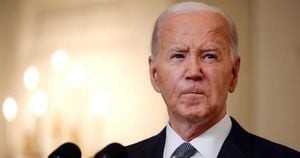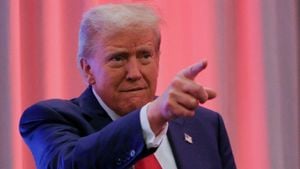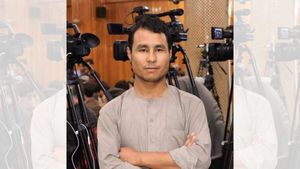Drake, known for his chart-topping hits, has recently turned the tables on music industry politics, launching legal proceedings against Universal Music Group (UMG) and Spotify. The issue at hand? The Canadian rapper claims the record label and streaming giant conspired to artificially inflate the popularity of Kendrick Lamar’s diss track, Not Like Us, which has become the centerpiece of their growing rivalry.
This legal challenge has drawn attention not only for its content but also for its reflection on the complex relationships within the music industry, especially as it pits two of hip-hop’s biggest stars against each other over alleged unethical marketing practices.
Drake filed documents with the New York State Supreme Court, asserting through his company, Frozen Moments, LLC, claims of unlawful manipulation of streams aimed at enhancing the visibility of Lamar's song at the expense of his own music. The rapper’s petition details accusations of using bots and payola schemes to promote Not Like Us, which has become one of Kendrick’s most successful tracks to date, boasting over 900 million streams on Spotify alone.
The controversy roots back to Kendrick’s recent release of Not Like Us, seen as not just another diss track but part of their long-standing feud—one marked by lyrical jabs and competitive bravado. Larry the Cable Guy once said, “This is gonna be good.” Similarly, fans find themselves at the edge of their seats as the allegations threaten to shake up the hip-hop scene.
People have been buzzing about the stunning accusations since the petition hit the court. Drake's attorneys have highlighted how the song surged to number one on the Billboard charts shortly after its release, raising eyebrows about how quickly Lamar’s track gained traction. The claim includes assertions laced with financial intricacies, such as alleged backroom deals with streaming services and radio stations aimed at boosting the track’s visibility, and even the accusation of UMG lowering its own royalty rates to facilitate this surge.
But what’s particularly interesting is the suggestion of payola, which is when record companies pay radio stations to play certain songs—a practice deemed illegal under Federal Communications Commission (FCC) regulations. Drake cited past cases, including UMG’s own settlements over similar practices years earlier, to bolster his argument, referencing a $12 million payment settlement made back in 2006 to the New York Attorney General’s Office for issues surrounding pay-for-play arrangements.
Drake's legal strategy involves probing the role of UMG and Spotify more deeply. The initial filings are labeled as “pre-action petitions,” which means they’re steps leading up to potential lawsuits, aimed at gathering evidence before launching formal complaints. He’s indicating he will pursue depositions from significant figures within these companies to strengthen his case.
Aside from just seeking transparency, he seems to be preparing for what may turn out to be multi-faceted legal battles. For his first petition, Drake is particularly focused on how UMG allegedly utilized various platforms, including claims of easing copyright restrictions for social media sharing of the song, which could provide enhanced visibility to the track.
UMG, for its part, has emphatically denied these suggestions. A spokesperson characterized Drake’s assertions as “offensive and untrue,” insisting their marketing practices are of the highest ethical standards and emphasizing the notion of allowing fans to determine their music preferences. UMG maintains they provide fair opportunities for all their artists to succeed based on their talent alone.
This denial raises intriguing questions about the nature of the music industry and the competitive tactics used by labels, particularly when dealing with artists of Drakes’ and Kendrick’s stature, both of whom UMG distributes music for. Could the mounting hype around Not Like Us be the result of genuine fan engagement, or is it the product of behind-the-scenes manipulation? Only time, and perhaps court findings, will tell.
For his part, Kendrick Lamar has yet to respond directly to these legal actions, but observers are noting the surreal nature of this feud transforming from personal and lyrical attacks to full-blown courtroom drama. Commentary from industry insiders suggests this new phase highlights the pervasive issues of integrity and competition as artists and their labels vie for dominance.
Throughout their careers, Drake and Kendrick have been viewed as foils to each other, but with this latest legal twist, the stakes have elevated dramatically. Artists have exchanged barbs and performed lyrical sparring matches, but now, it seems the tables have turned, with Drake employing legal channels rather than microphone battles to address perceived grievances.
Observers and fans alike are eager to see how this saga evolves. The industry stands to watch as it may redefine artist-label relationships and bring scrutiny to the practices of music promotion. There's also the question of how other artists may react to these developments. Will they follow suit if they feel betrayed by their labels? Will there be repercussions for UMG's practices?
The court case is still developing, but already the intricacies intertwining music, law, and celebrity culture have captured public fascination. The outcome remains uncertain, yet the discussions surrounding ethics and integrity within the industry are more alive than ever as both artists navigate their paths moving forward.
For now, amid social media reactions, detailed analyses, and the clamor of hip-hop enthusiasts, the lawsuit serves as a vivid reminder of the lengths to which artists will go to protect their brand and legacy. Drake and Kendrick's feud may have started with music, but its ramifications could reach far beyond simple charts and streams, stirring conversations about fairness, representation, and the future of the industry itself. Stay tuned!



